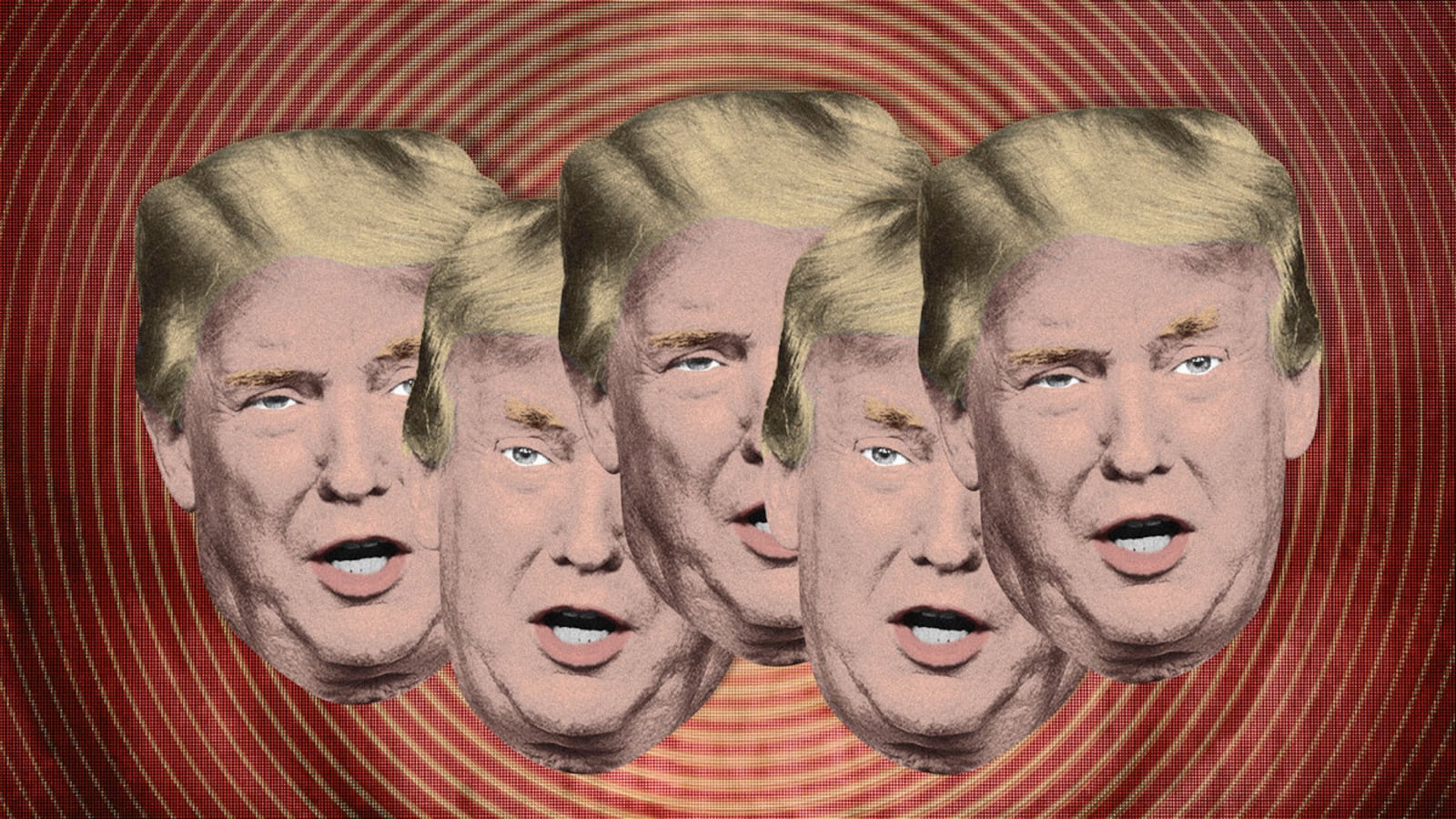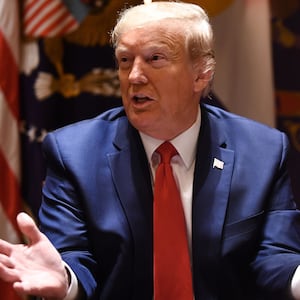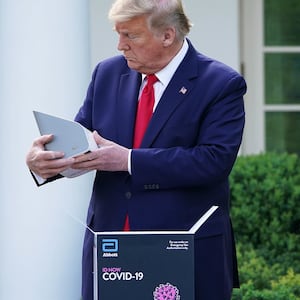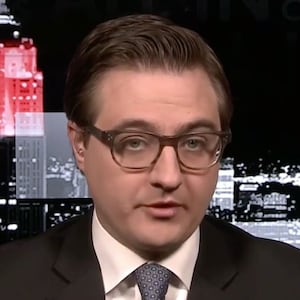Having been persuaded to drop his practice of daily press briefings that were hurting his poll numbers, President Donald Trump prepared a premature victory lap this week on testing capacity for the coronavirus, with a planned Thursday swing through the critical battleground state of Pennsylvania.
But as is typically the case, the president found it impossible to stick to script. Frustrated by his inability to affect the news cycle precisely how he wanted, Trump has thrown fits at his political nemeses and the press corps, often in increasingly dark and visceral ways. He’s lashed out at his top science adviser and baselessly accused a prominent MSNBC host of likely committing murder. He told one reporter he knew her better than she knew herself, got into a tiff with an Asian-American reporter after asking her to direct her question to the Chinese, alleged that his predecessor Barack Obama had committed some undefined crime, promoted the tweets of a prominent QAnon conspiracy theorist whom he’d once met in the Oval Office, suggested that Democrats were partaking in “elder abuse” in pushing Joe Biden as their presumptive presidential nominee, and seemingly pressured his Federal Communications Commission chairman to investigate a corporation just because he got mad at the TV.
That was all before Thursday.
It’s a form of uncontrolled id with which the president’s aides are well-accustomed. But it’s one that has complicated efforts by his White House to project a semblance of managerial calm while the virus death count rises and economic devastation deepens.
“The president is upset by the [media] coverage… so he takes the battle straight to the media,” said a senior administration official. “What else is new?”
What’s new is the context in which the latest outbursts are taking place—a body count well over 80,000 and little immediate relief in sight. Trump is entering an exceptionally tricky month of his presidency, trying to slow the souring of public opinion on his handling of the COVID-19 pandemic while shifting into campaign mode. It’s the type of effort that requires a bit of political precision and a deft hand at stagecraft.
Instead of his daily press conferences, for instance, Trump’s aides have attempted to put him into more presidential settings: sitting alongside CEOs or ushering governors in and out of the White House. And rather than hold rallies in crowded arenas—as he and his campaign had once hoped to do—the events outside of D.C. are still in swing states but now programmed around the coronavirus response, including a scheduled trip on Thursday to a medical-supply distributor in Allentown, Pennsylvania.
Various aides say the travel is cathartic for Trump, as it was clear that being trapped inside the White House was affecting his mood and exacerbating concerns that his obliterated campaigning schedule had hobbled his re-election prospects.
Beyond Thursday’s visit, those close to the president say that he is also demanding more be added to his official itinerary soon, so he can tout businesses and areas that he sees as essential to “reopening” states in the warmer summer months. One administration official familiar with the conversations said there had been discussions about making stops this summer “in several swing states” and that Trump had “talked about wanting to go to Texas [as soon as possible].” Officials on Trump’s campaign and in his administration have already started brainstorming ideas for getting him back on the road, including in the form of smaller rallies at drive-in movie theaters in rural America.
“As long as people use masks as long as they’re out there and follow the [social distancing and masks] rules, my sense is him getting out of the White House is important for him mentally, and under the circumstances, it’s helpful. But he needs to abide by the rules. If he doesn’t abide by the rules, it could be a problem,” said Ed Rollins, a veteran Republican strategist who leads the pro-Trump group Great America PAC. “You don’t want to be painted as someone who is violating the rules while purely campaigning—you want to be within the rules, not above the rules.”
Unable, as of now, to hit the road in a more prolific manner, Trump has begun fixating on the minutiae and pageantry of what he hopes will be uplifting public events during the summer. According to two individuals who have discussed the matter with the president, Trump has repeatedly inquired in the past few weeks about the planning progress for a 2020 reprise of his “Salute to America” Fourth of July celebration at the Lincoln Memorial in Washington, D.C. Recently, the president has insisted that the event could double as a celebration of the American spirit and resilience in the face of the virus, the sources said. Trump had also asked about ways the planners could make the flyover and the fireworks “bigger and better” than they were at last year’s event, one of the sources noted.
“[The president] sounded like he was really looking forward to hosting this, and said it would be great for the American people,” this person said. Trump has already said that he’d attend a fireworks event at Mount Rushmore on July 3.
But as he’s plotted out the pageantry that he hopes will help his political prospects, Trump has also been increasingly consumed by gripes over how he feels the press has covered his handling of the pandemic.
On Tuesday morning, the president tweeted unfounded allegations that longtime MSNBC host Joe Scarborough had possibly gotten “away with murder” in Florida many years ago, apparently in response to Scarborough’s censuring of Trump for lying, including over the virus. That was merely the most outlandish of the attacks on members of the media that the president found time to tweet about, even over Mother’s Day.
Trump also posted multiple tweets apparently calling on FCC Chairman Ajit Pai to take some kind of action against Comcast, NBCUniversal’s parent company, because Meet the Press host Chuck Todd had aired a segment taking Attorney General William Barr’s comments out of context. Then on Monday, Trump tweeted that the NBC host “should be FIRED by Concast (NBC) for this fraud.” saying that “If done by a Republican, would be ‘prosecuted’.” For good measure, he tagged Pai on his tweet.
Pai and the FCC didn’t weigh in on the president’s missive, though it would be a clear abuse of power for the chief federal regulator to so brazenly punish or reward certain companies based on the whims or political preferences of the sitting president.
This was hardly the first time Trump had impulsively tried to get Pai to act. In July 2018, the president lashed out on Twitter at Pai, stating that it was “so sad and unfair that the FCC wouldn’t approve the Sinclair Broadcast merger with Tribune,” and that this “would have been a great and much needed Conservative voice for and of the People.” Sinclair has been a staunch media ally of Trump and the GOP, and maintains a vast national broadcasting reach.
Still, it was a decision the FCC chairman stood by.
Not long after the president posted that July 2018 gripe to Twitter, Trump vented behind closed doors in the West Wing that he “wanted to” reprimand Pai in person for the Sinclair decision but that he was specifically advised by then-White House Counsel Don McGahn that he shouldn’t, due to how wholly inappropriate it would be for Trump to tamper with the FCC to benefit a politically allied media organization, according to a source with knowledge of the president’s complaint.
“So, I’m not going to,” Trump said, according to this source, before ultimately moving on.









